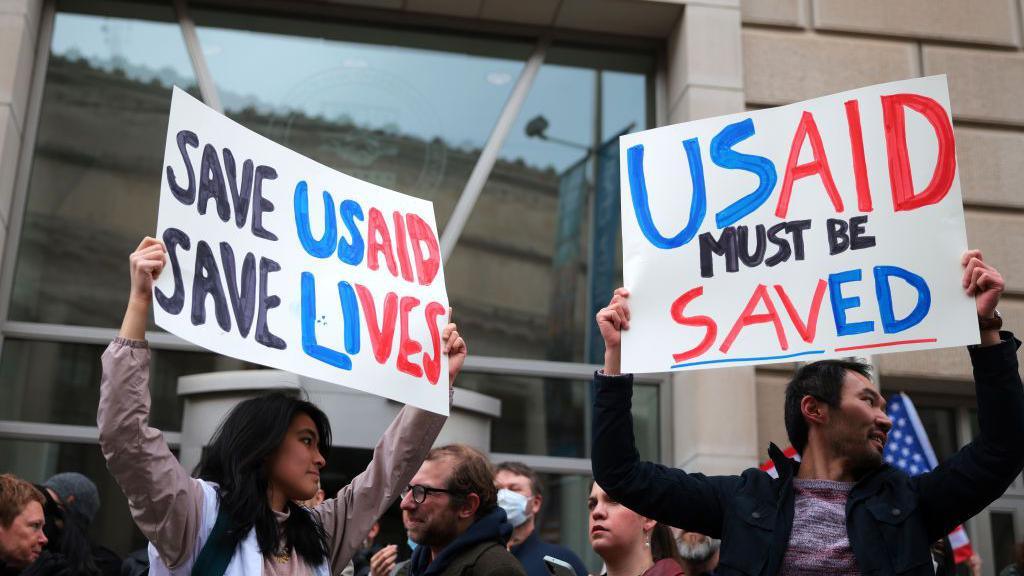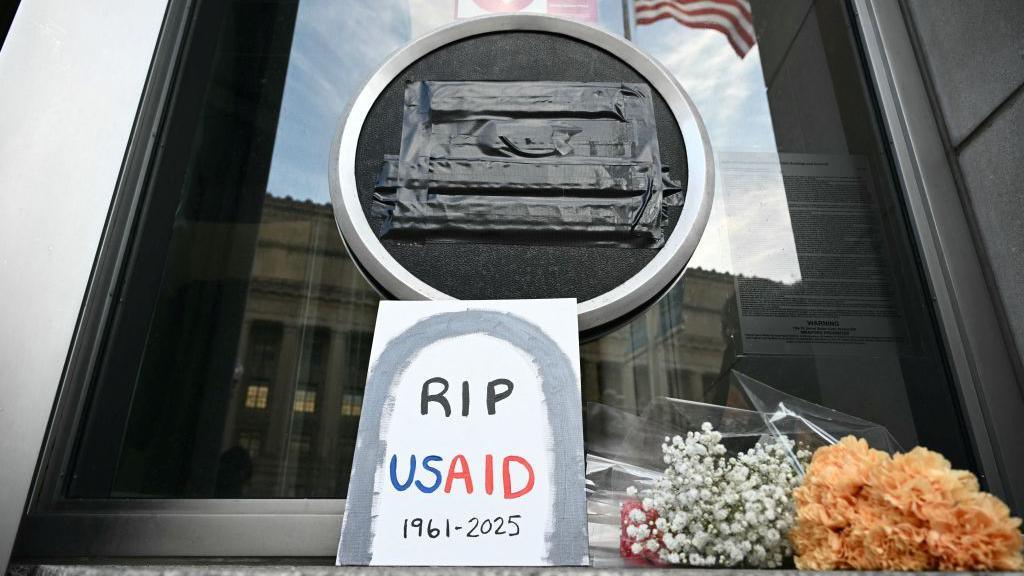Judge blocks Trump plan to put thousands of USAID staff on leave

- Published
A judge has temporarily blocked President Donald Trump from placing 2,200 workers at the US Agency for International Development (USAID) on paid leave, hours before it was due to happen.
Judge Carl Nichols issued a "limited" temporary restraining order,, external in response to a last-minute lawsuit filed by two unions trying to save the agency.
The order will remain in place for a week, until 14 February at midnight.
Trump has argued that USAID, the overseas aid agency, is not a valuable use of taxpayer money and wants to dismantle it - with plans to put nearly all of the agency's 10,000 employees on leave, except 611 workers.
Some 500 staff had already been put on administrative leave and another 2,200 were due to join them from midnight on Friday (05:00 GMT).
But the last-minute lawsuit on Friday argued the government was violating the US Constitution, and also that the workers were suffering harm.
Judge Nichols sided with the unions, saying they would suffer "irreparable harm" if the court did not intervene, while there would be "zero harm to the government".
The order also reinstates the 500 staff already placed on administrative leave.
"All USAID employees currently on administrative leave shall be reinstated until that date, and shall be given complete access to email, payment, and security notification systems until that date, and no additional employees shall be placed on administrative leave before that date," Nichols wrote.
The judge will also consider a request for a longer-term pause at a hearing on Wednesday.
It is unclear from the court order what will happen to the agency's remaining staff.
As the ruling came, officials had been removing and covering USAID signs at the organisation's headquarters in Washington DC. The agency's website, external is also inaccessible, leading only to a landing page about the personnel cuts.
What is USAID and why is Trump poised to 'close it down'?
- Published7 February
How a US freeze upended global aid in a matter of days
- Published30 January
USAID could slash staff to hundreds after placing most on leave
- Published7 February
USAID is the world's biggest aid donor - with much of its budget spent on health programmes around the world. Two-thirds of its 10,000 staff work overseas.
It is one of many federal agencies his administration is targeting as it works to slash federal spending in the US.
The Republican campaigned on overhauling the government and formed an advisory body named the Department of Government Efficiency (Doge) - led by tech billionaire Elon Musk - to slash the budget.
Watch: What Americans make of Trump's first weeks in office
Friday's ruling by Judge Nichols came in response to an emergency petition by the American Foreign Service Association and American Federation of Government Employees - two unions representing employees of the agency.
During the hearing, Judge Nichols - who was nominated by Trump during his first term - did not seem likely to grant other requests as part of the lawsuit, including to restore grants and contracts or reopen USAID buildings.
The legal action argued that the president was violating the US Constitution and federal law by attempting to dismantle the agency.
"Not a single one of defendants' actions to dismantle USAID were taken pursuant to congressional authorization," it said.
"And pursuant to federal statute, Congress is the only entity that may lawfully dismantle the agency."
Representing the Trump administration, justice department official Brett Shumate told the judge that the president "has decided there is corruption and fraud at USAID".

Hours after Trump took office on 20 January, he signed an executive order halting all foreign assistance until such funds were vetted and aligned with his "America First" policy.
That led to a stop work order at USAID, which runs health and emergency programmes in around 120 countries, including in the world's poorest regions.
"USAID IS DRIVING THE RADICAL LEFT CRAZY," Trump posted on his Truth Social platform.
"THE CORRUPTION IS AT LEVELS RARELY SEEN BEFORE. CLOSE IT DOWN!"
But Samantha Power, who was USAID chief under former President Joe Biden, wrote in a scathing New York Times opinion piece: "We are witnessing one of the worst and most costly foreign policy blunders in US history."
The US is by far the biggest single provider of humanitarian aid around the world. USAID's budget amounts to around $40bn - about 0.6% of total US annual government spending of $6.75tn.
The head of the United Nations' programme for tackling HIV/AIDS told the BBC the cuts would have dire impacts across the globe.
"AIDS related deaths in the next five years will increase by 6.3 million" if funding is not restored, UNAIDS executive director Winnie Byanyima said.